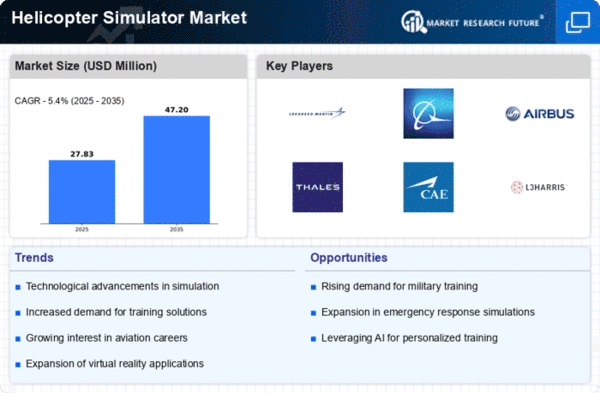Top Industry Leaders in the Helicopter Simulator Market

Strategies Adopted:
The key players in the helicopter simulator market employ various strategies to gain a competitive edge. One prevalent strategy involves continuous innovation in simulator technology to replicate real-world scenarios accurately. CAE Inc., for instance, focuses on enhancing the fidelity and realism of its simulators. FlightSafety International emphasizes customization and adaptability, tailoring their simulators to meet specific training needs. Thales Group, on the other hand, prioritizes strategic collaborations and partnerships to broaden its market reach.
Key Players:
- FLYIT Simulators Inc. (US)
- CAE Inc. (Canada)
- Fidelity Flight Simulation Incorporated (US)
- TRU Simulation Training Inc. (US)
Factors for Market Share Analysis:
Market share analysis in the helicopter simulator sector is influenced by several factors. Technological advancements, the range and capabilities of simulators, cost-effectiveness, and global market presence are critical determinants. CAE Inc.'s dominance can be attributed to its extensive product range and emphasis on innovation. FlightSafety International's market share is influenced by its customer-centric approach and adaptability in simulator design. Thales Group's strategic alliances contribute to its market share growth, demonstrating the significance of partnerships in this competitive landscape.
New and Emerging Companies:
Amidst the established players, new and emerging companies are making strides in the helicopter simulator market. Companies such as Quantum3D, Ryan Aerospace, and Elite Simulation Solutions are gaining attention. Quantum3D specializes in visual computing solutions for simulation and training, offering innovative solutions for the helicopter simulator market. Ryan Aerospace focuses on cost-effective, modular helicopter simulation systems, catering to diverse training needs. Elite Simulation Solutions leverages advanced technologies to provide realistic helicopter simulation experiences.
Industry News:
Recent developments and industry news play a pivotal role in shaping the competitive landscape of the helicopter simulator market. Advancements in virtual reality (VR) and augmented reality (AR) technologies are influencing simulator designs. Additionally, the integration of artificial intelligence (AI) for enhanced pilot training is gaining traction. Collaborations between simulator manufacturers and aviation organizations to develop standardized training programs are making headlines, emphasizing the industry's commitment to improving safety and efficiency in helicopter operations.
Current Company Investment Trends:
Investment trends in the helicopter simulator market reflect a growing focus on technology innovation, global expansion, and strategic partnerships. Companies are allocating substantial investments to research and development to introduce cutting-edge features in their simulators. CAE Inc., for instance, has invested significantly in creating adaptive learning technologies and expanding its training network. FlightSafety International has been directing investments towards upgrading its simulation facilities worldwide. Thales Group's investments are geared towards strengthening its position through strategic acquisitions and partnerships.
Overall Competitive Scenario:
The helicopter simulator market is characterized by intense competition driven by continuous technological advancements and a growing emphasis on pilot training. The competition is not only limited to the fidelity and realism of simulators but extends to the level of customization, adaptability, and the ability to provide cost-effective solutions. Established players are maintaining their dominance through a combination of innovation, global presence, and strategic collaborations. Meanwhile, new entrants are disrupting the market by introducing novel technologies and addressing specific niche segments. The competitive scenario is expected to intensify as the demand for skilled helicopter pilots continues to rise, necessitating more sophisticated and tailored training solutions.
Recent Development:
In October 2023: CAE announced that it had been awarded a contract to provide the Royal Canadian Air Force (RCAF) with a new helicopter simulator. The simulator will be used to train RCAF pilots on the CH-148 Cyclone helicopter.
In September 2023: Thales announced that it had completed the delivery of a new helicopter simulator to the French Air Force. The simulator will be used to train French Air Force pilots on the H225M Caracal helicopter.











